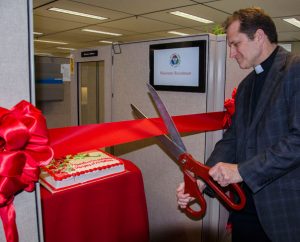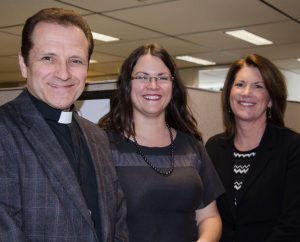By Melanie Ave
On Thursday, March 13, the Rev. Dan McMiller grabbed the oversized pair of scissors and snapped the red ribbon in half, officially marking the beginning of a new missionary-recruitment team at the LCMS International Center in St. Louis.
The dozen or so LCMS employees in attendance clapped and cheered.

“And now we’ll let Dan cut the cake with the scissors,” joked the Rev. Dr. Edward Grimenstein, LCMS Office of International Mission (OIM) associate executive director.
The ribbon-cutting ceremony unveiled a new office space for the four-member recruitment team headed by McMiller. He serves as the director of recruitment for the OIM, which is the Synod’s ministry overseeing mission work in countries outside the United States.
Other members of the recruitment team include Erin Alter, manager, missionary applications for the OIM, and Maureen Williams, administrative assistant. A job posting will go up soon for the yet-to-be-named fourth member, who will focus on attracting laity and other church workers to the mission field. McMiller primarily focuses on clergy recruitment.
The event highlighted the need for more missionaries to help spread the message of Christ worldwide.
The LCMS has about 120 missionaries around the world. Recruiting more is a priority.
Delegates to the 2013 LCMS convention instructed the Synod to recruit and place more career missionaries, voting to make it a priority to “double the number of career missionaries engaged in church planting, mercy work and theological education during the next triennium.”
Grimenstein said that in the next year, the LCMS would like to place 25 clergy and 75 other church workers and laity in the mission field.
Missionary roles include theological educators, communication specialists, teachers, medical workers, mission developers, business managers, project managers, volunteer coordinators and church planters, among many others.
Missionaries typically work alongside LCMS church partners and emerging church partners, who request the Synod’s help in fulfilling their needs.
The opportunities, Grimenstein said, are immense.
In East Africa, there are an estimated 15 million Lutherans.

“They could literally say, in the next few months, we need 50 people now,” Grimenstein said. “We need to be ready. That’s why we need a recruitment team.”
The missionary-recruitment team is currently seeking to place 20 short-term missionaries who can teach English as a Foreign Language at schools and churches overseas for two to three years or longer. Applications are requested by April 1 for candidates, who must be college graduates and members of LCMS congregations.
“We need people to go in our stead to answer the call, not only for our Lord, but the plea for help from our partner churches around the world,” McMiller said. “We have unbelievable opportunities to help our partners establish solid Lutheran congregations and seminaries and outreach at a time of great hunger and need for the Gospel in different parts of the world.
“We can’t turn our backs on them.”
While the need for missionaries is great, so is the need for LCMS members and congregations to support missionaries and the Synod’s work of caring for missionaries.
Missionaries need regular supporters who help fund their work, pray for them and remain in contact.
“It’s not just a paycheck,” said McMiller, who served for 14 years in Latin and Central America as a missionary. “It’s a relationship; knowing the church is holding you up in prayer and supporting you with their sacrificial gifts. That motivates you as you are out facing difficult times as a missionary.”
Congregations can “adopt” missionaries through the “Together in Mission” program and families can support missionaries through the “Mission Senders” program. Individuals can give to specific missionaries and the LCMS Global Mission Fund.
Only 520 of the Synod’s congregations provide regular support to missionaries through Together in Mission.
“We have about 6,000 congregations,” McMiller said. “A lot of our congregations are not informed about the need and opportunity to adopt missionaries.”
“If every congregation gave $5,000, we’d have $30 million to support missionaries and missions,” Grimenstein added.
He emphasized that the church needs missionaries.
“Every day people are dying,” Grimenstein said. “Every day people are dying not having faith in Christ. That’s why we need to do it. We’re helping the global mission, the one mission of Christ in all this.”
To see a list of missionary service opportunities, visit here.
For more information about missionary service, contact McMiller at daniel.mcmiller@lcms.org.
For more information about how a congregation can support LCMS missionaries through the Together in Mission program, contact debra.feenstra@lcms.org.
Support the LCMS Global Mission Fund by clicking here.
Melanie Ave is a staff writer with LCMS Communications.
Updated March 20, 2014



